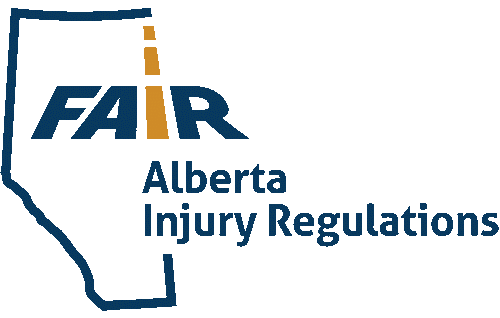Section 581 of Insurance Act, RSA 2000, c I-3 permits a person injured in a motor vehicle accident to obtain an advance on settlement funds. The section works in conjunction with Section 5.6 (3) of the Fair Practices Regulation, Alta Reg 128/2001. The relevant portions of this legislation read:
Section 581:
(1) When an insurer makes a payment on behalf of an insured under a contract evidenced by a motor vehicle liability policy to a person who is or alleges to be entitled to recover from the insured covered by the policy, the payment constitutes, to the extent of the payment, a release by the person or the person’s personal representative of any claim that the person or the person’s personal representative or any person claiming through or under the person or by virtue of the Fatal Accidents Act may have against the insured and the insurer.

(2) Nothing in this section precludes the insurer making the payment from demanding, as a condition precedent to the payment, release from the person or the person’s personal representative or any other person to the extent of the payment.
(3) If the person commences an action, the Court must adjudicate on the matter first without reference to the payment, but in giving judgment the Court must take the payment into account and the person is entitled to judgment only for the net amount, if any.
(4) The intention of this section is to permit payments to a claimant without prejudice to the defendant or the defendant’s insurer, either as an admission of liability or otherwise, and the fact of any payment must not be disclosed to the judge or jury until after judgment but may be disclosed before formal entry of the judgment.
(5) The Lieutenant Governor in Council may make regulations
(a) authorizing the Court to make an order requiring an insurer to make a payment under this section to a claimant in advance of any judgment;
(b) prescribing or otherwise describing the circumstances under which an order referred to in clause (a) may be made.1Insurance Act, RSA 2000, c I-3, s 581.
Section 5.6 (3):
The Court may make an order under section 581 of the Act, on any conditions it considers appropriate, requiring the insurer to make a payment to a claimant who applies to the Court under subsection (2) of this section where the Court is satisfied that
(a) as a result of the injuries of the claimant, the claimant is unable to pay for the necessities of life, or
(b) the payment is otherwise appropriate.2Fair Practices Regulation, Alta Reg 128/2001, s 5.6(3).
A body of case law has developed interpreting section 581. In Shannon v 1610635 Alberta Inc, 2014 ABCA 393 (CanLII), Justice Cote writes for the majority of the Court of Appeal in paragraph 37:
Without repeating explanations and qualifications found above, here is a brief recap of the tests.
- An order for an advance payment requires two things:
(a) the defendant is probably liable to the plaintiff for the amount requested (or more); and
(b) without that payment, the plaintiff is likely to go without necessities (or things broadly analogous), or unlikely to be able to prosecute his or her claim for damages.
- If #1 is satisfied, the court should weigh approximately the plaintiff’s likely loss without an advance payment against the defendant’s likelihood of overpaying (looking at probabilities and money amounts in both cases).
- The court should flexibly consider imposing terms and conditions on one of the parties, to mitigate the risk to one or both parties.3Shannon v 1610635 Alberta Inc, 2014 ABCA 393 (CanLII) at para 37 [Shannon].
When applying to the Court for a section 581 advance, it is important to provide the Court a range of general nonpecuniary and pecuniary damages when it is possible to do. In Stewart v Insurance Corporation of British Columbia, (2014) ABQB 578 (CanLII), paragraphs 36 & 37, it was held that:
There is no doubt that the Applicant should be entitled to some general damages for pain and suffering. There appears to be little doubt that the claim for past or future loss of income will be made out. This will require a careful balancing between this type of loss and the general damages that relate to Mr. Stewart continuing to work with pain.
The difficulty is that the range of general damages is not properly, or adequately made out. At this stage I would simply be pulling a figure out of the air.4Stewart v Insurance Corporation of British Columbia, (2014) ABQB 578 (CanLII) at para 36-37 [Stewart].
Similarly, Siemens v Co-Operators General Insurance Co., (2015) ABQB 578 (CanLII) at paragraph 25, the Court held as follows:
The plaintiff might have demonstrated a housekeeping loss, or a care loss corresponding to the husband’s loss of income (he is not a party). She also could demonstrate what her generals would be worth at a minimum. A reference to Goldsmith (Damages for Personal Injury and Death) might be enough, at this stage. But there is none of this.5Siemens v Co-Operators General Insurance Co. (2015), ABQB 578 (CanLII) at para 25 [Siemens].
The Court may place terms or conditions upon the plaintiff as a condition for getting the advance. In Shannon v 1610635 Alberta Inc., Justice Cote writes for the majority at paragraph 35:
One term should be virtually routine. Any plaintiff getting an advance payment should give a formal written covenant, or an undertaking (promise) enforceable by the court, to repay any ultimate overpayment, with interest. And that plaintiff should charge any other benefits to come from the accident from anyone, with that repayment.6Shannon, supra note 3 at para 35.
In Bennett v Certas Home and Auto Insurance Co., [2019] A.J. No. 604 (Q.B.) (Q.L), the Court was of the view that the plaintiff had delayed the action by not providing her tax returns. As a condition to providing the advance, the Court ordered the Applicant to schedule her tort action down for either Alternative Dispute Resolution or for Trial within 12 months of the Order, failing which, the advance payments will be suspended.7Bennett v Certas Home and Auto Insurance Co. [2019] A.J. No. 604 (Q.B.)(Q.L) [Bennett].
Trial grade evidence is not required for a S. 581 advance payment. A Judge must be able to reach a fair and just determination of the merits of the application. The record must allow the Judge to make the necessary findings of fact. In Simpson v. Co-operators General Insurance Co., [2017] A.J. No. 298 (QL), Justice Renke writes …
The second reflection on the evidential foundation for an advance payment order is that at this stage of proceedings, we are not in a trial. We haven’t heard viva voce evidence, and I take Mr. Nagy’s point that a Court must ensure that it’s not unfair to plaintiffs by demanding evidence suitable for trial long before the trial, and the way I put this point earlier is that it wouldn’t be proper to run the trial before the trial is run.
…
Further to this point about the evidential foundation for an advance payment order, the evidence that will be required is going to be dependent on a particular case. So a case-by-case approach is going to be required, and that’s because the amount of evidence or the type of evidence required will vary, depending on the nature of the accident, depending on the medical history of the plaintiff leading up to the accident. It will depend on what’s occurred to the plaintiff following the accident, and it will turn on any medical evidence that’s available at the time of the application.
So we don’t have trial grade evidence at this point, but simply the nature of the proceeding, and I do keep in mind that we can’t impose unfair standards relating to the evidential record on a plaintiff at this point.8Simpson v Co-operators General Insurance Co. [2017] A.J. No. 298 (QL) at para 12-14 [Simpson].
It is clear that the evidentiary standard on a Section 581 advance application is a balance of probabilities. In Simpson v. Co-operators General Insurance Co., Justice Renke writes:
During the application, there was discussion of the evidential foundation for an advance payment order, and I’ll offer three reflections for considerations. Mr. Matthews has suggested in his materials that a plaintiff is subject to a high standard of proof, and I — I don’t agree with that formulation of the approach as being consistent with the authorities, for these reasons. First, the standard of proof is balance of probabilities, and that’s confirmed in paragraph 15 of Shannon and in Justice Crighton’s Bexson, [2014] A. J. No. 713 decision. What we read in paragraph 10 is that the applicant need not prove his case on a balance of probabilities at this early stage, and somewhat later in paragraph 10:
. . . but the applicant must demonstrate, on a balance of probabilities and with the evidence available to the Court, that he will probably meet the civil standard of proof at trial for the recovery he seeks.
And the Bexson approach is reflected in the decision of Justice [sic] Schlosser in Stewart v Insurance Corporation of British Columbia, 2014 ABQB 578 at paragraph 19, and at item 3 of that paragraph, Master Schlosser writes that:
An advance payment requires, among other things, that the applicant has demonstrated that it is probable that liability will be established on a balance of probabilities.9Ibid at para 9-10.
It is inappropriate for a Court to tie s. 581 payments to steps in the litigation. In Han v Royal & Sun Alliance Insurance Co. of Canada, (2016) A.J. No. 569 (QL), the respondent suggested that the advance be provided using a staggered approach to completion of various steps in the litigation. What makes this problematic and inconsistent with the objective of 581 is that, the defense can delay payments by failing to schedule steps in the litigation.10Han v Royal & Sun Alliance Insurance Co. of Canada, (2016) A.J. No 569, (QL) at para 34, 36-42, 45-55 [Han].
Hearsay evidence presented by both parties is admissible, contrary to Rule 3.8(2). In Alexander v TD General Insurance Co., [2019] A.J. No. 225 (QL), the Court followed the approach taken by the Court in Macrae (Litigation Representative of) v Intact Insurance Co., [2017] A.J. No. 489 (QL) and allowed affidavit evidence not sworn on personal knowledge. Affidavit evidence based on information and belief was held to be permissible in section 581 applications.11Alexander v. TD General Insurance Co., [2019] A.J. No. 225 (QL) at para 8-10 [Alexander]. This effectively relaxes Rule 3.8(2).
The importance of proving liability should not be overlooked. In Macrae (Litigation Representative of) v Intact Insurance Co., the plaintiff suffered a severe brain injury and did not have the capacity to swear an affidavit as to how the accident happened. The Plaintiff’s father, the Litigation Representative swore the affidavit even though he was not at the scene of the accident. The Court wrote:
In written material, the plaintiff did not reference admissible evidence surrounding the actual accident to support its position of probable liability. This application is an originating application and by virtue of Rule 3.8(2), a statement of facts within the personal knowledge of the person swearing the affidavit must describe the content of such affidavit.
Here the evidence contained in the affidavit of Mr. MacRae discussing his view of the accident was clearly hearsay. The reference I’m speaking to is contained in the March 22nd, 2016, affidavit of Wayne Richard. While describing the accident in general detail, Mr. Richard did acknowledge in questioning that he was not present at the accident and had no personal knowledge of what occurred. In effect, this is hearsay evidence of unknown reliability and presumptively inadmissible. I note no argument was advanced to support admissibility as either a principled or recognized exception.
In oral submissions, counsel for the plaintiff tendered documentation to support his argument that probable liability lies with the defendant. In particular, he pointed to a questioning for discovery of Keith Toews which, in his view, provides a more fulsome explanation of Mr. Toews’ evidence surrounding what occurred. In effect, that transcript contains questions and answers concerning Mr. Toews’ behaviour in his viewing of the intersection before entering that particular location. He also applied to enter into evidence a copy of an Information indicating that Mr. Toews, the driver, pled guilty to failing to proceed safely after stopping at an intersection. That conviction relates to events on April 7th, 2014, and, indeed, more particularly to the incident underlying the tort claim in this application.
I do note that, in the transcript I have just referred to, that Mr. Toews did admit to paying that particular fine.
There was some argument advanced about admissibility and whether or not there was technical compliance with the Alberta Evidence Act as it pertained to the Information copy provided, and to the Alberta Rules of Court to admission of the questioning for discovery. I am prepared to admit both documents into evidence for my consideration. In exercising that discretion, I note the philosophy of Mr. Justice Renke in a recent decision in which, in essence, he recognized the importance of attending to this type of application in an expeditious manner, provided the record permitted a fair and just determination. In effect, Justice Renke’s approach was to not require a trial before a trial. Given the helpful submissions advanced by counsel, and their willingness to address this particular issue, and recognizing that counsel for the defendant objected to its admissibility, I have come to the opposite conclusion, as already noted.12Macrae (Litigation representative of) v. Intact Insurance Co., [2017] A.J. No. 489 (QL), at para 8-13 [Macrae].
Advances are usually awarded in a lump sum, or in installments. In Bexson v Williams, [2014] A.J. No 713 (QL), the Court awarded an advance payment of $35,000 payable in $5,000 monthly installments.13Bexson v Williams, [2014] A.J. No 713 (QL) at para 33 [Bexson]. In Han v Royal & Sun Alliance Insurance Co. of Canada, the Court awarded a $40,000 advance in installments of $20,000, $10,000, and $10,000 payable June 2, 2016, August 2, 2016 and October 3, 2016.14Han, supra note 10 at para 54-55, 57. In Graham v. Peace Hills General Insurance Co., [2018] A.J. No. 497 (QL), the Court awarded an advance in the amount of $10,000, payable as a lump sum.15Graham v. Peace Hills General Insurance Co., [2018] A.J. No. 497 (QL) at para 114 [Graham]. In Macrae (Litigation representative of) v. Intact Insurance Co., the Court awarded an advance in the amount of $75,000, payable as a lump sum.16Macrae, supra note 12 at para 21. In Needham v. Economical Mutual Insurance Co., [2019] A.J. No. 233, (QL), Justice Fagnan awarded the Applicant an advance in the amount of $40,000. $20,000 of this advance was to be payable forthwith and the remaining $20,000 was to be paid out in monthly installments of $1,500.17Needham v. Economical Mutual Insurance Co., [2019] A.J. No. 233 (QL) at para 25 [Needham]. In Alexander v. TD General Insurance Co., the Court awarded an advance in the amount of $75,000, payable as a lump sum.18Alexander, supra note 11 at para 25.
Case law continues to develop around section 581 advances. I hope this article serves as a helpful summary and encourages more 581 applications to be brought so that we can assist our clients in dire financial need.








